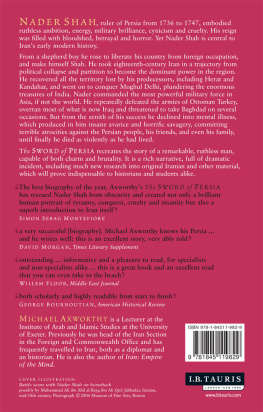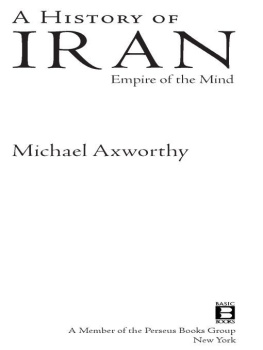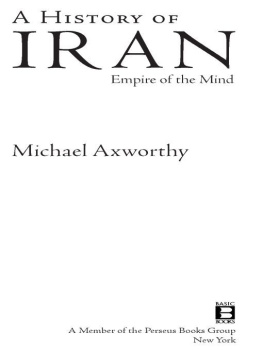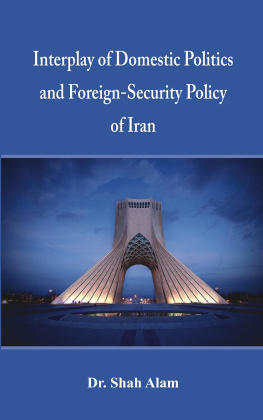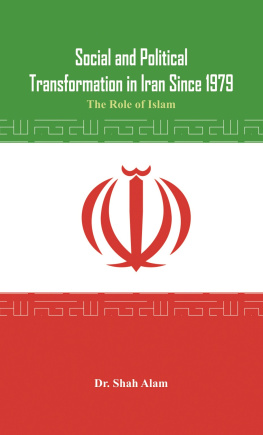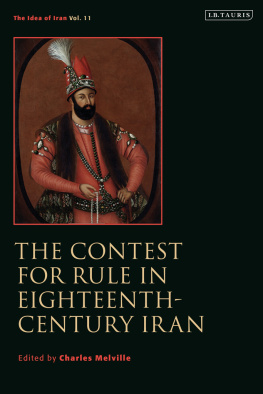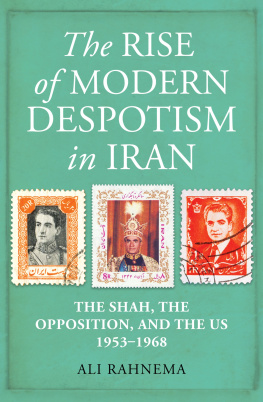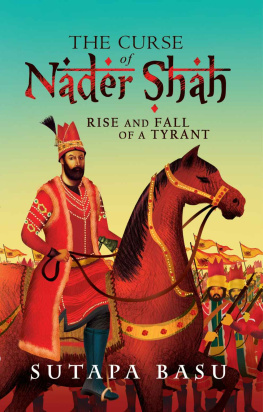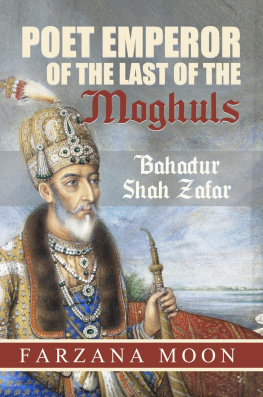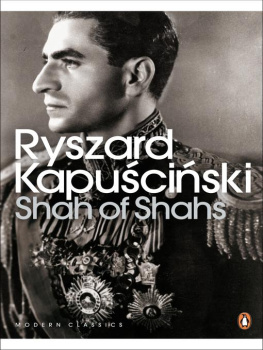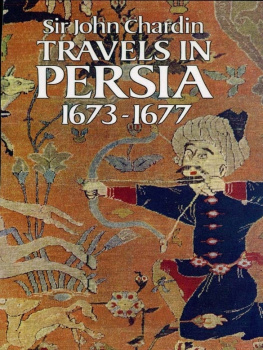MICHAEL AXWORTHY is a Lecturer at the Institute of Arab and Islamic Studies at the University of Exeter. Previously he was head of the Iran Section in the Foreign and Commonwealth Office and has frequently travelled to Iran, both as a diplomat and an historian. He is also the author of Iran: Empire of the Mind.
The best biography of the year, Axworthys The Sword of Persia has rescued Nader Shah from obscurity and created not only a brilliant human portrait of tyranny, conquest, cruelty and insanity but also a superb introduction to Iran itself, which makes this book not just a beautifully-written, compelling work, but one that is also utterly relevant today.
Simon Sebag Montefiore
a very successful [biography]. Michael Axworthy knows his Persia and he writes well: this is an excellent story, very ably told.
David Morgan, Times Literary Supplement
Michael Axworthy has done an outstanding job of trying to understand what moved Nadir the result is a book that is informative and a pleasure to read, for specialists and non-specialists alike. Thanks to the authors deft handling of the subject, Nadir as a person becomes real and his actions become understandable well researched this is a great book and an excellent read that you can even take to the beach.
Willem Floor, Middle East Journal
both scholarly and highly readable from start to finish valuable for both specialists and graduate students of history this new volume presents a wealth of information hitherto unknown and offers some fresh and unique interpretations on the rise and reign of Nader Shah Afshar.
George Bournoutian, American Historical Review
Using a vivid style, this work chronicles the rise and fall of Nadir Shah from his early origins in northern Khurasan to his assassination by his followers in 1747 It draws on a variety of recent studies and a considerable range of primary sources to create a work accessible to both specialists and general readers Axworthys lively text is quite groundbreaking The Sword of Persia provides a very good overview of Nadirs career as well as an up-to-date summary of research on him
Ernest Tucker, International Journal of Middle East Studies
I have read this book with considerable pleasure and admiration Axworthy has taken account of the latest research, contributed to that himself, and produced a book that will be welcomed by specialists and the wider history-minded public.
Dr Charles Melville, Pembroke College, Cambridge
Nader Shah has been too long neglected, and Michael Axworthys The Sword of Persia provides new and valued insight into his critical role in Irans eighteenth-century history.
Professor Gene Garthwaite, Dartmouth College
This is, without any doubt, a valuable book. Axworthy gives a fascinating picture of Iran in the eighteenth century and provides a key to a better understanding of many of the issues after Nader Shah relating to the Zand and Qajar eras.
Professor Sadegh Zibakalam, Tehran University

. Son of the Sword.
This is the sword traditionally believed to have been carried by Nader Shah on his campaigns. It is now in Tehran. It was inscribed and embellished in the reign of Fath Ali Shah 50 or more years later. The scabbard is encrusted with diamonds. Nader used the imagery of the sword to describe himself on a number of occasions.
(Photo courtesy of the Royal Ontario Museum.)
To my father
Published in 2006 by I.B.Tauris & Co Ltd
6 Salem Road, London W2 4BU
175 Fifth Avenue, New York NY 10010
www.ibtauris.com
In the United States of America and in Canada distributed by
Palgrave Macmillan, a division of St Martins Press
175 Fifth Avenue, New York NY 10010
Copyright Michael Axworthy, 2006
The right of Michael Axworthy to be identified as the author of this work has been asserted by the author in accordance with the Copyright, Designs and Patents Act 1988.
All rights reserved. Except for brief quotations in a review, this book, or any part thereof, may not be reproduced, stored in or introduced into a retrieval system, or transmitted, in any form or by any means, electronic, mechanical, photocopying, recording or otherwise, without the prior written permission of the publisher.
References to websites (URLs) were accurate at the time of writing.
ISBN 10: 1 85043 706 8
ISBN 13: 978 1 85043 706 2
eISBN: 978 0 85773 347 4
A full CIP record for this book is available from the British Library
A full CIP record for this book is available from the Library of Congress
Library of Congress catalog card: available
Contents
Maps and Illustrations
Maps
. Persia
. Golnabad
. Karnal
Illustrations
. Son of the Sword
. View from the East
. A party of Turkmen slavers with their captives
. Not Enough to be Nice
. Zanburak
. Isfahan
. Jazayer
. Naders camp
. View from the West
Acknowledgements
I n writing this book I have benefited from the generous help and advice of a large number of people. Chief among these were Chris and Homa Rundle, Nargess Majd, Christos Nifadopoulos and Leo Drollas, without whose translations of source material and patient re-examination of individual points and queries the finished result would have been much inferior. Peter Avery was an encouragement and inspiration, as well as a great help on a number of specific points, and translations. Chris Rundle also read through the manuscript, as did Sandy Morton, Charles Melville, Willem Floor, Ali Ansari and Jill Bowden; and their comments and suggestions much improved the book (though they were not always accepted), as did those of Andrew Newman, who looked at parts of the manuscript at an early stage. Willem Floor allowed me sight of some of his unpublished research, which proved very important for the book. Paul Luft, along with Ali Ansari and Anoush Ehteshami, was instrumental in securing me a Research Fellowship from Durham University for the purposes of this project, and was helpful and encouraging in a variety of other ways. Ali Ansari was a stimulus and a guide at the very beginning of my interest in Nader Shah, without whom none of this would have happened.
Many others also gave me guidance, encouragement and support, whether in suggesting new lines of research or analysis, answering specific queries, or by helping me find material that was proving difficult. These included Ernie Tucker, John Appleby, Kathryn Babayan, John Gurney, Mansur Sefatgol, Heidi Hofstetter (especially), Aaron Dunne, Hannah Carter, John Carter, Sergei Tourkin, Adrian Steele, Sanjay Subrahmanyam, Michele Bernardini, Jennifer Scarce, Ian Heath, Stephen Blake, Robert Hillenbrand, Bernard OKane, Ian Maddock, Poppy Hampson, Bella Pringle, and Iona Molesworth-St. Aubyn. I am also grateful to my sister, Helen Axworthy, for her help with the maps and for her support generally.
Inez Lynne, Gosia Lawik, Edith Gray and the other staff of the London Library were generous and tolerant beyond normal limits in finding and lending books, equalled only in helpfulness by the staff of the Cambridge University Library, especially Claire Welford and the others in the Rare Books room, and Les Goodey.

